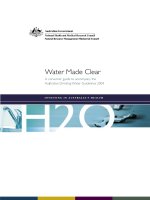A Practical Guide to Particle Counting for Drinking Water Treatment - Chapter 22 potx
Bạn đang xem bản rút gọn của tài liệu. Xem và tải ngay bản đầy đủ của tài liệu tại đây (198.5 KB, 5 trang )
195
CHAPTER
22
Grab Samplers
All four of the manufacturers offer grab samplers, with Met One, Chemtrac, and
ARTI leading the way. IBR still offers the Hiac Royco unit originally designed for
Hach as the “Log Easy.” Each of the units is similar in size and weight, and operates
in like manner.
A. EQUIPMENT FEATURES
The ARTI WQA 2000, Met One WGS-267 Grab Sampler, and the Chemtrac
2400 PS are designed to operate in grab or continuous, online mode. The IBR can
as well, although its internal pump cannot be bypassed. The pumps in each of these
units are not designed for continual operation, so it is recommended that long-term
online applications be set up using a constant-head overflow weir and gravity flow.
1. Sample Delivery System
All of the units employ small DC gear pumps that pull the sample through the
sensor. The speed of the pump is controlled by a DC voltage source, which is not
user adjustable. The ARTI WQA 2000 and the Met One WGS-267 employ a user-
adjustable needle valve rotometer to allow the operator to adjust the flow rate. The
other units provide no flow adjustment or display. The gear pumps provide a smooth,
quiet, pulseless flow and can clog if large concentrations of particles are present.
They are designed for around 400 hours of operating life, which will cover several
years worth of grab sampling, but only a few weeks of continuous operation.
The ARTI, Chemtrac, and Met One units are easily converted to continuous,
online operation by moving a couple of pieces of tubing. This allows for the pump
to be bypassed, and connection made to a gravity flow system.
L1306/frame/pt03 Page 195 Friday, June 23, 2000 2:16 PM
© 2001 by CRC Press LLC
196 A PRACTICAL GUIDE TO PARTICLE COUNTING
All of the units operate off AC power and rechargeable DC batteries. Battery
operation provides ease of portability, as well as reducing the electrical shock hazard
when operated in a wet environment.
2. Packaging
The Chemtrac 2400 PS is packaged in a standard NEMA 4X plastic box, with
the sensor extending from the side. This allows the sample flow to be completely
separated from the battery and electronics. The AC power adapter is a sealed “desk-
top” power supply similar to the type used for laptop computers. This smaller NEMA
box is mounted on a simple adjustable stand and stored in a rugged watertight ABS
plastic equipment case for ease of storage and portability. The 2400 PS has a local
display and a membrane touch keypad operator interface. No printer is available.
See Figure 22.1.
The Met One WGS 267 is built into a folding deep-drawn aluminum case, with
the counting electronics mounted in the door, and the sensor, power supply, battery,
and sample delivery system in the larger body of the case. Unlike the Chemtrac unit,
the model 267 must be taken apart to access the sensor for cleaning. Liquid does
pass into the case, allowing for the potential for leakage into the power supply. A
fault isolation circuit breaker is built into the power cord to shut off the system if
the power supply is shorted. A membrane keypad and local display are provided,
along with a small thermal printer. See Figure 22.2.
Figure 22.1
Chemtrac PC2400PS grab sampler. (Courtesy of Chemtrac Systems, Inc., Nor-
cross, GA.)
L1306/frame/pt03 Page 196 Friday, June 23, 2000 2:16 PM
© 2001 by CRC Press LLC
GRAB SAMPLERS 197
The ARTI WQA 2000 comes in a cast aluminum housing with side panels that
open to provide access to the sensor sample ports. An LCD graphic display mea-
suring 128
×
128 pixels is mounted on the top between a membrane keypad and
thermal graphics printer. The top is sloped downward to provide a comfortable
working angle for the operator. The unit has a retractable handle and shoulder strap,
and comes with an optional ruggedized plastic storage case (Figure 22.3).
The IBR VersaCount has a handle attached for portability, but does not have an
external case. The front of the unit incorporates a keypad and display, along with a
series of bar codes. A bar code reader is attached to the unit. This rather odd feature
is included because the unit is a modified version of a Hiac Royco portable air
particle counter. Air particle counters are designed to be moved from room to room,
since air is difficult to “grab-sample.” Bar codes were mounted at various locations
where the samples were taken, and provided a quick way of tagging the data.
Drinking water plants are not set up the same way, and the considerably heavier
water version is not convenient to carry around. It is reported that some of the early
customers would stick the bar code wand into the sample, thinking that it was the
particle sensor.
The IBR VersaCount is designed such that the sample passes through the enclo-
sure that houses the electronics, power supply, battery, and sample delivery system.
A small standalone thermal printer is available as an option.
Figure 22.2
Met One WGS 267 grab sampler. (Courtesy of Pacific Scientifc Instruments, Grants
Pass, OR.)
L1306/frame/pt03 Page 197 Friday, June 23, 2000 2:16 PM
© 2001 by CRC Press LLC
198 A PRACTICAL GUIDE TO PARTICLE COUNTING
3. Counting Features
The Chemtrac 2400 PS uses the same counter electronics as the standard online
unit, but uses different firmware (“Firmware” is operating code that is programmed
into the electronics. It is designed to be a more permanent part of the system than
“software.”) This change allows for up to 16 user-adjustable size channels to be
programmed, along with other parameters. Up to 16 tagnames can be programmed
by the user as well, so that the data can be stored according to the location where
the sample was taken. The keypad is used to cycle through several options for sample
time, number of runs, and tagname. Up to 320 samples can be stored in the unit.
The liquid crystal display shows the tagname, sample number, and cycles through
the particle size data.
The Met One WGS-267 uses a comparator-based counter, which provides six
particle size channels preset at the factory. The operator keypad is used to set the
sample period and interval, time and date, the number of sample runs, and several
counting modes. Total counts, counts per milliliter, or counts per 100 ml can be
selected. A special concentration mode provides a quick measure of the particle
concentration, so that the need for dilution may be quickly ascertained. An audible
alarm will indicate sensor problems, dirty cell, or overconcentration. An ID number
Figure 22.3
ARTI WQA 2000 Portable Water Quality Analyzer. (Courtesy of Art Instruments,
Inc., Grants Pass, OR.)
L1306/frame/pt03 Page 198 Friday, June 23, 2000 2:16 PM
© 2001 by CRC Press LLC
GRAB SAMPLERS 199
can be programmed in to tag the data in memory or on the printout. A log removal
function allows instant calculation of log removal between two samples. Up to 250
samples can be stored in a rotating buffer (“rotating” means that the first sample
will be overwritten by the 251st sample, etc., so that the most recent samples will
be saved in memory if the limit is exceeded).
The ARTI WQA 2000 uses the same counting electronics as the online unit and
is available with either of the sensors. The keypad can be used to select from several
preset sample and purge volumes. Eight particle size channels are provided, and
the user may choose between cumulative or differential counts in particles per
milliliter. Samples may be labeled to provide for log removal calculations between
the first record of a label and all the other records of the same label. A large storage
buffer allows for storing data from up to 500 samples.
The WQA 2000 also accepts inputs for the measurement of other water quality
parameters, such as pH, turbidity, conductivity, etc.
The IBR VersaCount provides eight size ranges preset at the factory. Data can
be displayed in counts per milliliter or total counts, and log removals can be calcu-
lated and displayed. User-selectable alarms provide an audible alarm when count
limits are exceeded. The above-mentioned bar code panel is used to input settings.
Up to 350 sample runs can be stored in memory for download.
4. Computer Interface
All the grab samplers are equipped with RS-232 serial data interface to allow
the stored data to be downloaded to a PC. Both Met One and IBR provide only
DOS-based software for this purpose. Chemtrac has a 16-bit Windows program
called “Grabbit,” which is used to download tagnames and size ranges into the
counter electronics, along with a range of sample times and numbers of sample runs
that provide the options selectable from the operator keypad. This allows the user
to customize selection options. This program also includes reporting software, which
is built around the Crystal Reports program used by the online TracWare software.
Met One does have an optional counter electronics and software package
designed for those desiring particle distribution data. The counter electronics is a
2048-channel multichannel analyzer, which is mounted in an ISA slot in the PC. A
package called WGS is used to collect and view the data. This system is not
compatible with Windows software, and must be run in DOS mode. It is designed
to take the particle pulses directly from the sensor, bypassing the built-in grab-
sampler electronics.
ARTI provides a Windows-based software package for accessing data from the
Aquarion.
L1306/frame/pt03 Page 199 Friday, June 23, 2000 2:16 PM
© 2001 by CRC Press LLC







![the game audio tutorial [electronic resource] a practical guide to sound and music for interactive games](https://media.store123doc.com/images/document/14/y/oo/medium_oon1401475551.jpg)

